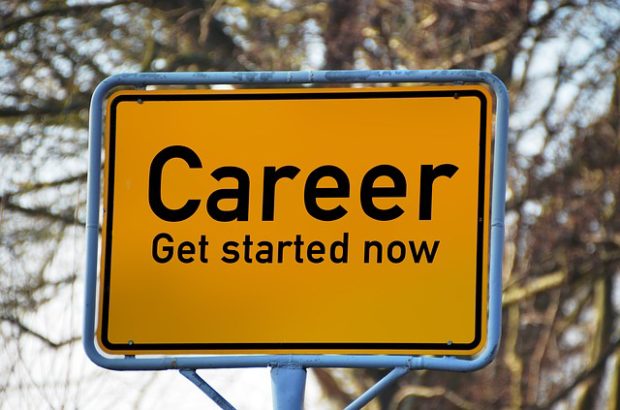Effective Immediately: Meet Emily Bennington!
Today’s post is an interview with the one and only, Ms. Emily Bennington. Emily and I met in person for the first time in Columbus, Ohio about 2 weeks ago. We spent the day sharing story after story about work, life and our first few years after college. As you can imagine, we laughed just as much as we talked!
Meeting with Emily was not only a lot of fun, but it also showed me how much I still have to learn. Ten years her junior, I really admire women like Emily. She knows her stuff and she does it all: she has a family, volunteers in her community, rocks at work, is a part-time college professor AND writes books. Um, bring on the caffeine!
I’m very excited to announce and support Emily’s first published book, Effective Immediately: How to Fit In, Stand Out, and Move Up at Your First Real Job. I’ve been reading this little gem and find it fun, easy to read and extremley relevant whether you are still in college or have been working for 5 years.
Emily had a rough start to corporate life. Her stories are pretty funny and all true. Emily co-wrote Effective Immediately with her first post-college mentor, Skip Lineberg, who was there to witness and guide her through many “rookie” moments.
There’s also a second reason I want to introduce you to Emily Bennington. You’ll be seeing a lot more of Emily here on Ms. Career Girl. Why?
Welllll, Emily and I are currently working on a proposal for an absolutely AWESOME book for young women in corporate environments. I’ve done lots of research (and let’s be honest, I’ve probably read 35 of our new book’s “competitors”) and there is NO book out there like the one we are working on. Get excited ambitious ladies!
On to the interview, please meet Emily Bennington!
Tell us about your most embarrassing entry-level career moment.
I was working PR on a grassroots advocacy campaign for a regional airport project and I sent out a press release stating that Senator Rockefeller endorsed our position. Problem was, I failed to run the release by the senator’s staff. As it turned out, he didn’t endorse it at all and so my mistake became the story. I knew I was in trouble when the reporter called me for a quote and, sure enough, the next day I was greeted with a front page, above-the-fold article quoting the President of our County Commission saying, “I don’t know who sent that release, but whoever it was should be fired.” I seriously thought I was going to lose my job. Fortunately, my boss understood it was a rookie mistake and let me slide with a warning, but my dad calls me “Miss Information” to this day.
A lot of recent grads have trouble transitioning their wardrobe from “class to classy”. What was your concept of “business casual” back in the day?
Haha. I know this is a loaded question because you already know the answer! When I entered the workforce, I obviously made a physical transition, but it took me a while to make the mental one. In many ways, I still saw myself as living the college life (going out dancing on a work night for example) and my wardrobe was a reflection of that. I wore things I thought would easily go from day-to-night, but were really just inappropriate for the office. One time I was changing in the office kitchen and my boss’ husband walked in on me! The first question is, of course, why was I changing in the kitchen? (The answer is: I have no idea.) However, I look back on that and see someone who was still more concerned with having fun than being taken seriously as a professional. I’ve learned a ton since then about the importance of being in control of the image you project, and it definitely starts with how you dress.
You’ve told me a bit about your co-author, Skip Lineberg, who was also your first post-college mentor. What role did Skip play in your early career and life?
Skip was the first person to take a proactive interest in my success and professional development. At the beginning of my career, Skip really spent a lot of time coaching and challenging me to be better. One example I’ll never forget was when I had my first performance review and asked for a raise, Skip made me “demonstrate I was worth it” by successfully completing a series of projects ranging from writing a review of How to Win Friends and Influence People to finding a logistical “problem” in the office and solving it using TQM processes. At the time, a lot of my friends and family were puzzled by this, wondering why he didn’t just give me the raise I’d already earned, but I knew better. I saw Skip’s challenge as an opportunity to prove to him that I was not only worth more money, but more responsibility as well. Since then, our relationship has evolved into more of a partnership than a mentor / student connection, but I’m so blessed that we’re still able to work together after all these years.
How important do you think mentors are for ambitious young professionals?
Mentors are incredibly important but they are also an endangered species. Businesses are just so lean these days and everyone is busy enough doing their own jobs, so they don’t have much time to coach someone else along. I was talking about this today with a group of friends at lunch. All of us are in different fields, all successful in our own right, yet NONE of us had been trained in the jobs we hold currently. I think this “sink or swim” mentality is an epidemic in the workforce and really reinforces the need for employers to devote more resources to training and staff development. However, young professionals need to know that, sadly, the odds of having a great mentor aren’t good and they should be prepared to invest in their own success as well.
For young women who are looking to become working career Moms in the future, how do you think we can best set ourselves up for this path from the start?
This is a tricky question because the answer is different for everyone. Personally, I was 29 when I had my first child and I can say with complete certainty that – yes – waiting a little longer allowed me to become more established in my career. I’d be lying if I said there weren’t times I wish I would havehad them earlier, but the flip side is that kids are expensive and it’s nice to be able to afford the two I have. I don’t harbor any regrets about being a working mom and I definitely don’t allow anyone to make me feel guilty about it either. So the best advice I can giveto career moms is to be 100% present where you are. In other words, if you’re at work, give100% to your job. If you’re at home, give 100% to your family. I promise you it won’t be a perfect 50/50 split all the time, but your work will make you appreciate your children more… and vice versa.
Check out Emily’s blog professionalstudio365.com, follow Effective Immediately on Facebook and buy her book on Amazon.com!




